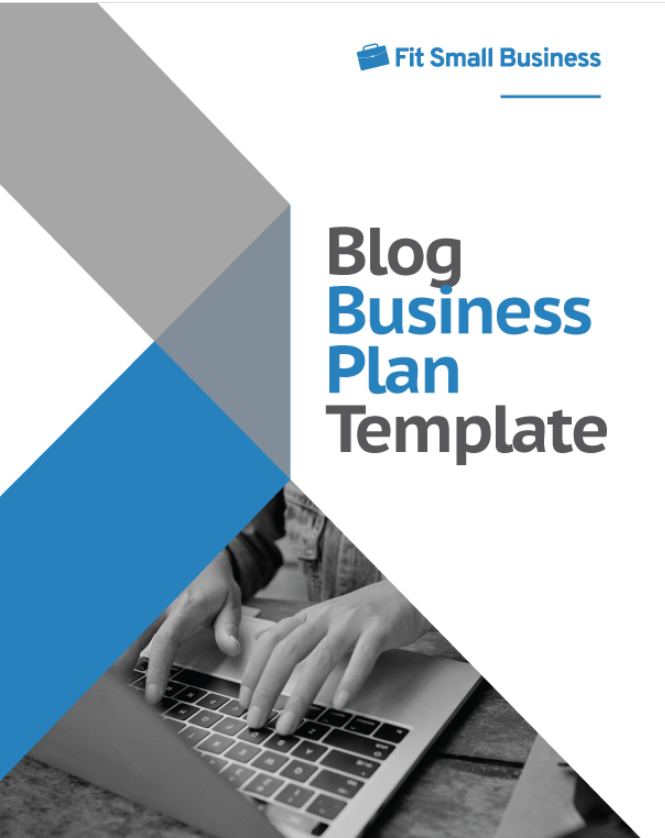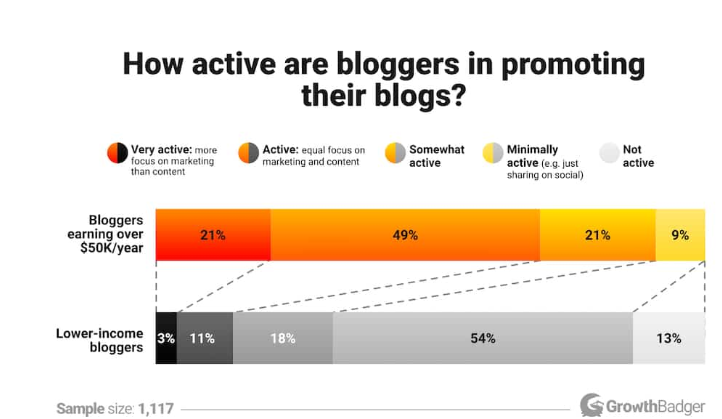If you’re wondering how much money bloggers make, you may be in for a surprise. Many blog owners earn a modest $200 to $2,500 a month in their first year of blogging. Established bloggers who implement strong monetization strategies earn $3,500 to $15,000 monthly. Top bloggers can earn seven-figure incomes from their blogs. There are different types of roles and streams of income for bloggers. Let’s explore what they are and how much they make.
Different Types of Blogger Roles
When you think of bloggers, many think only of those who create and build their own blogs. Yet, there are actually three different types of bloggers:
- Bloggers who work full time or part time for companies where they blog
- Freelance bloggers who offer blogging as a service
- Independent blog owners who create their own blogs
How Do Bloggers Get Paid?
Blog salaries vary a lot and depend on how bloggers earn their money. Writers who blog full-time for businesses earn an average of $40,000 to $80,000 per year, which is on par with the $63,200 annual median pay for writers and authors in the United States. Experienced freelance bloggers who write for others’ blogs earn between 10 cents to $1 per word—beginners may earn less. Freelance bloggers are paid directly from clients or through the freelancing network they use.
Independent bloggers—those who start their own blogs—don’t earn a traditional blogger salary. Instead, they make their money through various monetization techniques, including affiliate marketing, sponsored posts, advertising, memberships, services, online courses, and product sales. These are the bloggers we’ll focus on here.
What Blog Owners Make From Various Monetization Methods
Blog owners with page views from 10,000 to 100,000 a month can typically earn between 2 cents and 10 cents per page view from advertising, which translates to $200 to $10,000 per month. Sponsored posts average around $25 to $750 per post, depending on audience size, niche, and sponsorship arrangement.
Bloggers who sell products and online courses can earn even more—as high as $10,000 or more per month. Affiliate marketing is yet another way to earn a good income as a blogger. For example, travel blogger Adam Enfroy earned $44,262 in March 2020 from affiliate marketing alone—and this was generated from site traffic of 303,960 and only 2,577 email subscribers.
The bloggers who make the most money use a diversified approach to monetizing their blogs. Most have at least two to three different ways to make money, with affiliate marketing, advertising and selling products or courses being the most popular.

Rosemarie Groner’s Busy Budgeter blog has earned seven figures since its inception using a diversified monetization strategy. (Source: busybudgeter.com)
What Influences How Much Bloggers Make?
As a blogger and professional blogging consultant with two decades of experience as a business growth strategist, I’ve seen all types of bloggers create all levels of income. Those who make the most money blogging do so because they:
- Have a solid business plan in place
- Select a profitable blogging niche
- Use effective monetization strategies for their audience and niche
- Create amazing content that audiences love
- Have a solid grasp on search engine optimization (SEO)
- Proactively market and promote their blogs
New bloggers often make the mistake that creating a blog and posting some articles is enough. It’s not; you need to do all the above to build a blog that makes significant money.
How Long Does it Take to Make Money Blogging?
The answer to how long it takes to make money blogging is not a one-size-fits-all answer. Many people start their blogs as hobbies or side hustles, and hence don’t devote 40 hours a week to blog development; there’s nothing wrong with that approach but it will take a bit longer to start making money. You simply won’t earn a full-time living with part-time effort, particularly at the launch phase of your blog.
Even working full time, very few people earn much if any income in their first few months of blogging. As a rule of thumb, strategic bloggers that use smart content and business strategies can start earning a modest full-time income—around $30,000 to $60,000—in their first year of blogging. That can double or even triple in year two. There are always exceptions as some earn a lot more while others earn less.
Many well-established bloggers report that it takes less effort to generate the same or even higher earnings over time. So while you can’t skimp on putting in the effort when building your blog, that initial effort can keep yielding positive financial results for years to come. It is possible to earn a great income from blogging without working full-time hours.

The Chelsea’s Messy Apron blog earned $40,000 in its first year.
(Source: chelseasmessyapron.com)
How Much Popular Bloggers Make
To give you an insider’s look at the true income potential of blogging, I asked professional bloggers to share how they successfully monetize their blogs. I think it’s important to set realistic expectations, so you’ll see all types of bloggers at all income levels on this list.
I included an approximation of each blogger’s income based on the information they provided or from the income reports available on their sites.















Tips for How to Make the Most Money Blogging
I don’t want to give you the impression that all bloggers make money; they don’t. A Problogger survey of bloggers found that 26% earn under $10 a month and nearly 50% earn less than $100 a month. That’s not because it’s not possible to make money blogging— the 15 real-life examples just shared prove profitable blogs exist.
The bloggers I’ve seen who aren’t making money often fail to understand the path to creating a profitable blog. It’s not rocket science, but building a profitable blog isn’t exactly instinctive either (that’s why I spend so much time writing about how to make money blogging!).
Another reason bloggers struggle to monetize is that their enthusiasm for starting a blog sometimes wanes after they see how much work is involved— especially in the first year or so. Blogging is not a get-rich-quick proposition.
If you’re serious about making money as a blogger, here are a few power tips for you that’ll put you on the road to success.
Decide What Type of Blogger You Want to Be
Be clear about the type of blogger you want to be from the get-go. It’s fine to start a blog as a passion project with the hope of one day monetizing it. It’s also fine to go all-in as a professional blogger intent on making a full-time living blogging.
One tip: Don’t quit your day job thinking you’ll make a lot of money overnight. Unless you have a very large nest egg or other financial resources to fall back on, start your blog while keeping your 9-to-5. Remember, there’s no magic formula for when you’ll start making money or how much you’ll make.
Choose a Profitable Niche
Take great care in selecting your blogging niche. Make sure there is an adequate audience for the subject areas that you want to blog about. Do your homework to find the perfect niche market for you.
Create a Blog Business Plan
Treating your blog like a real business from day one will increase your odds of success tenfold. Take the time to create a business plan for your blog that outlines every step of the blog creation, monetization, and promotion process.

Create a Professional Website
You won’t earn a great living from a shoddy website. That’s why you need to develop an optimized, fast-loading, professional website for your blog.
When it comes to blogging platforms, there are several terrific options on the market. However, for ultimate flexibility and scalability, I recommend going with a self-hosted WordPress blog using a reliable hosting provider. Bluehost offers affordable, secure hosting solutions that can grow with you as your blog grows. Even better, Bluehost services start at just $2.95 per month.
Post Amazing Content on Your Blog
Top bloggers don’t make generous incomes from so-so content. Instead, they sweat the details and provide the best answers to their visitors’ questions and offer effective solutions to tough problems. If your goal is to create an income through blogging, make sure you scope out the competition and then create an amazing blog content strategy that elevates you to the top of your niche.
Create a Sound Monetization Strategy
Don’t create a blog without having a sound strategy for how you plan to make money. You don’t need to have your monetization efforts in place before you launch; since you don’t have much traffic in the first few months of blogging, you wouldn’t earn much anyways. Still, you do need to know where you’re heading.
There are so many ways to make money blogging. You can monetize through affiliate marketing, advertising, sponsored posts, memberships, or by selling services, products, or online courses. Don’t think you’re limited to just one monetization tactic. Blogs that earn the highest profits always diversify their income streams.
Optimize Your Site for Search Engines
If you don’t know much about search engine optimization (SEO), I recommend that you boost your knowledge as soon as possible. The only way for your blog to rank high on Google—a critical traffic source for most bloggers—is to optimize it for search. This can be a little tricky, but it can make the difference between dismal results and strong profits.
Use Smart Marketing and Promotion Strategies
The most successful bloggers are considerably more active in promoting their blogs than bloggers who struggle to make a buck. Don’t underestimate the importance of getting the word out about your blog.
You’ll want to take advantage of all sorts of ways to promote your blog, including email marketing, social media marketing, proactive blog outreach, and perhaps even paid ads. Experiment—test what works best for your blog and do more of what works and less of what doesn’t.

Bloggers who actively promote their blogs earn considerably more than those who don’t. (Source: growthbadger.com)
Bottom Line
Now that I’ve answered the burning question, “How much do bloggers make?” and told you how blogs generate income, you can start creating a profitable blog right now—or improve profits on the blog you’ve already started. Every successful blogger will tell you that making money blogging will take time, but treating your blog like a real business will give you the best foundation to create and achieve your blogging income goals.